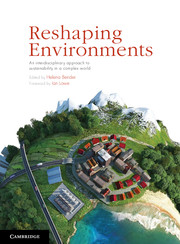Book contents
- Frontmatter
- Contents
- Contributors
- Acknowledgements
- Introduction Reshaping environments – an opportunity for envisioning the future
- Part 1 Cases
- 1 Costa Rica’s dry north-west
- 2 Reshaping land transport in Singapore
- 3 Evaluating different ways of managing forested landscapes
- 4 Changing the landscape management paradigm with farmers
- 5 Meeting development goals without blowing your carbon budget
- 6 The EGLE has landed
- 7 Reshaping the Murray-Darling Basin, Australia
- 8 Burning questions
- Part 2 Skills
- Part 3 Theory
- Index
- Plate Section
- References
5 - Meeting development goals without blowing your carbon budget
from Part 1 - Cases
Published online by Cambridge University Press: 05 February 2013
- Frontmatter
- Contents
- Contributors
- Acknowledgements
- Introduction Reshaping environments – an opportunity for envisioning the future
- Part 1 Cases
- 1 Costa Rica’s dry north-west
- 2 Reshaping land transport in Singapore
- 3 Evaluating different ways of managing forested landscapes
- 4 Changing the landscape management paradigm with farmers
- 5 Meeting development goals without blowing your carbon budget
- 6 The EGLE has landed
- 7 Reshaping the Murray-Darling Basin, Australia
- 8 Burning questions
- Part 2 Skills
- Part 3 Theory
- Index
- Plate Section
- References
Summary
Introduction
In 2006, Peter McGlynn from Melbourne and Harris Bein from Ilahita, a village in Papua New Guinea (PNG), sought the University of Melbourne’s assistance to improve the health and well-being of the people of Harris’s village. They had grave concerns about the long-term sustainability of the village for two reasons – a devastating drought in 1997–98 saw many people die due to poor nutrition and water supplies and, more generally, there is an increasing pressure on the village’s subsistence food supply and limited land resources because of population growth.
This case study describes a series of investigations and reflections based on a combination of research conducted in the village and students’ design project work on Ilahita. Aspects of the environmental and social conditions in Ilahita as well as two possible ways for providing improved water supplies will be examined. The potential impact of changes on the local and global environment will be considered in proposing an improvement to the system. The framework of examining issues laid out in Chapter 16 will be used.
- Type
- Chapter
- Information
- Reshaping EnvironmentsAn Interdisciplinary Approach to Sustainability in a Complex World, pp. 114 - 138Publisher: Cambridge University PressPrint publication year: 2012



